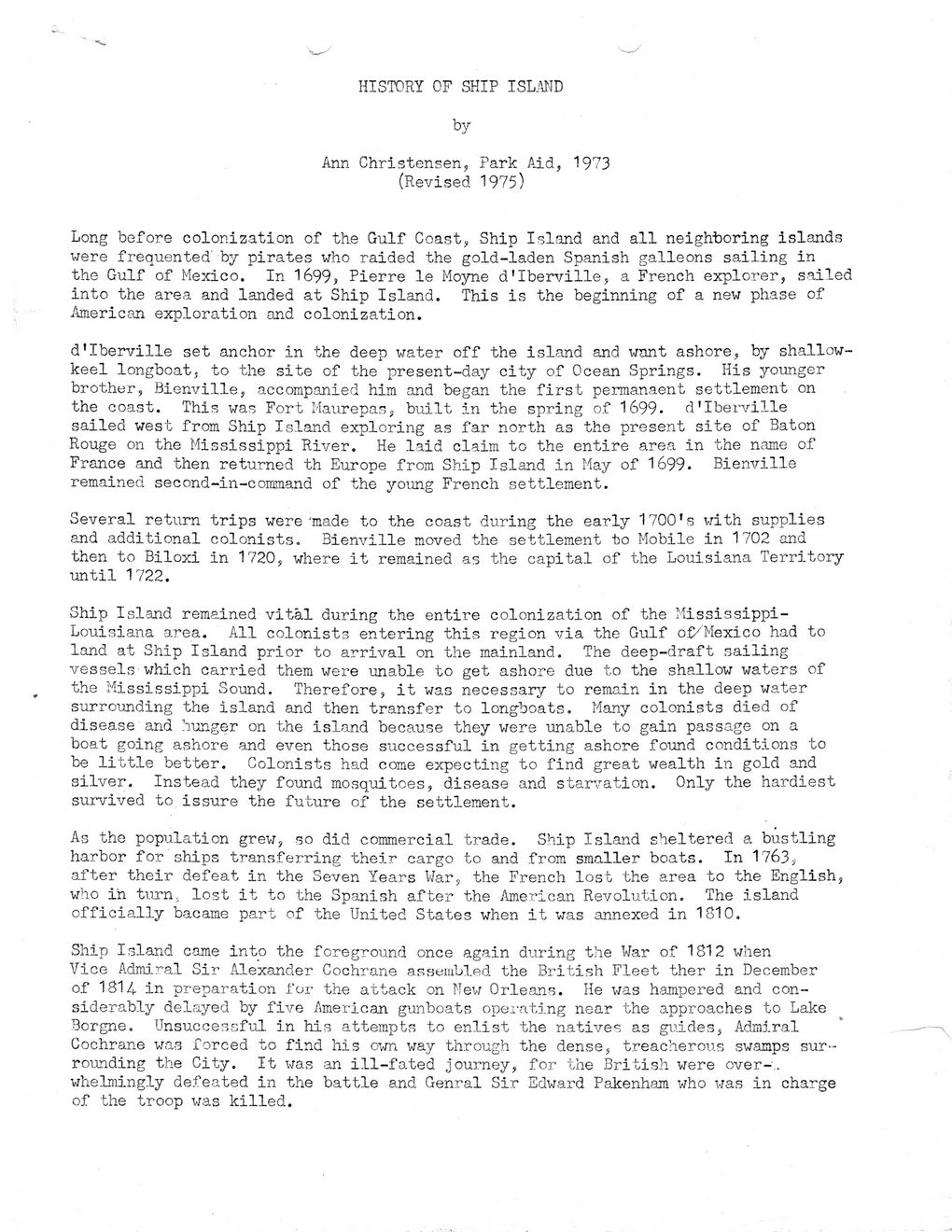This text was obtained via automated optical character recognition.
It has not been edited and may therefore contain several errors.
HISTORY OF SHIP ISLAND by Ann Christensen, Park Aid, 1973 (Revised 1975) Long before colonization of the Gulf Coast, Ship Island and all neighboring islands were frequented' by pirates who raided the gold-laden Spanish galleons sailing in the Gulf of Mexico. In 1699, Pierre le Moyne d'Iberville, a French explorer, sailed into the area and landed at Ship Island. This is the beginning of a new phase of American exploration and colonization. d'Iberville set anchor in the deep water off the island and want ashore, by shallow-keel longboat, to the site of the present-day city of Ocean Springs. His younger brother, Bienville, accompanied him and began the first permanaent settlement on the coast. This was Fort Maurepas, built in the spring of 1699. d1Iberville sailed west from Ship Island exploring as far north as the present site of Baton Rouge on the Mississippi River. He laid claim to the entire area in the name of France and then returned th Europe from Ship Island in May of 1699. Bienville remained second-in-command of the young French settlement. Several return trips were made to the coast during the early 1700's with supplies and additional colonists. Bienville moved the settlement to Mobile in 1702 and then to Biloxi in 1720, where it remained as the capital of the Louisiana Territory until 1722. Ship Island remained vital during the entire colonization of the Mississippi-Louisiana area. All colonists entering this region via the Gulf of7Mexico had to land at Ship Island prior to arrival on the mainland. The deep-draft sailing vessels which carried them were unable to get ashore due to the shallow waters of the Mississippi Sound. Therefore, it was necessary to remain in the deep water surrounding the island and then transfer to longboats. Many colonists died of disease and hunger on the island because they were unable to gain passage on a boat going ashore and even those successful in getting ashore found conditions to be little better. Colonists had come expecting to find great wealth in gold and silver. Instead they found mosquitoes, disease and starvation. Only the hardiest survived to issure the future of the settlement. As the population grew, so did commercial trade. Ship Island sheltered a bustling harbor for ships transferring their cargo to and from smaller boats. In 1763, after their defeat in the Seven Years War, the French lost the area to the English, who in turn^ lost it to the Spanish after the American Revolution. The island officially bacame part of the United States when it was annexed in 1310. Ship Island came into the foreground once again during the War of 1812 when Vice Admiral Sir Alexander Cochrane assembled the British Fleet ther in December of 1814- in preparation for the attack on New Orleans. He was hampered and considerably delayed by five American gunboats operating near the approaches to Lake Borgne. Unsuccessful in his attempts to enlist the natives as guides, Admiral Cochrane was forced to find his own way through the dense, treacherous swamps surrounding the City. It was an ill-fated journey, for the British were over-., whelmingly defeated in the battle and Genral Sir Edward Pakenham who was in charge of the troop was killed.

Mississippi Sound History of Ship Island (1)